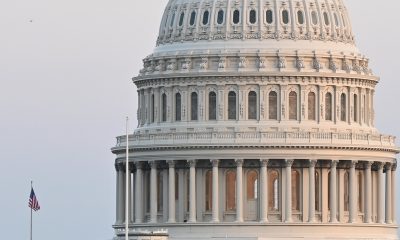State Department
State Department directive pauses most US foreign aid spending
PEPFAR among impacted programs

Secretary of State Marco Rubio on Friday directed State Department personnel to stop nearly all U.S. foreign aid spending for 90 days.
A copy of the directive that Politico obtained requires State Department staffers to immediately issue “stop-work orders” on nearly all “existing foreign assistance awards.”
President Donald Trump on Jan. 20 issued an executive order that paused U.S. foreign aid “for assessment of programmatic efficiencies and consistency with United States foreign policy.”
“All department and agency heads with responsibility for United States foreign development assistance programs shall immediately pause new obligations and disbursements of development assistance funds to foreign countries and implementing non-governmental organizations, international organizations, and contractors pending reviews of such programs for programmatic efficiency and consistency with United States foreign policy, to be conducted within 90 days of this order,” it reads. “The Office of Management and Budget (OMB) shall enforce this pause through its apportionment authority.”
Politico reported Rubio’s directive is more expansive than the executive order, although it does not stop military aid to Egypt and Israel, emergency food assistance and “legitimate expenses incurred prior to the date of this.” The President’s Emergency Plan for AIDS Relief, known as PEPFAR, is among the programs impacted.
“This is a matter of life or death,” said International AIDS Society President Beatriz Grinsztejn in a press release. “PEPFAR provides lifesaving antiretrovirals for more than 20 million people — and stopping its funding essentially stops their HIV treatment. If that happens, people are going to die and HIV will resurge.
The promotion of LGBTQ+ and intersex rights was a cornerstone of the Biden-Harris administration’s foreign policy.
The decriminalization of consensual same-sex sexual relations was one of the previous White House’s priorities in these efforts. The U.S. Agency for International Development in 2023 released its first-ever policy for LGBTQ+- and intersex-inclusive development.
Rubio this week issued a directive that bans embassies and other U.S. diplomatic institutions from flying the Pride flag. A second directive that Rubio signed directs State Department personnel to “suspend” any passport application in which an “X” gender marker is requested.
“This guidance applies to all applications currently in progress and any future applications,” reads the directive. “Guidance on existing passports containing an ‘X’ sex marker will come via other channels.”
The directive stems from a sweeping executive order — “Defending Women from Gender Ideology Extremism and Restoring Biological Truth to the Federal Government” — that Trump signed on Monday after he took office. The president in his inaugural speech noted the federal government’s “official policy” is “there are only two genders, male and female.”
State Department
State Department’s 2024 human rights report could jeopardize LGBTQ+ asylum cases
‘Targeted and malicious act’ will ‘directly endanger lives’
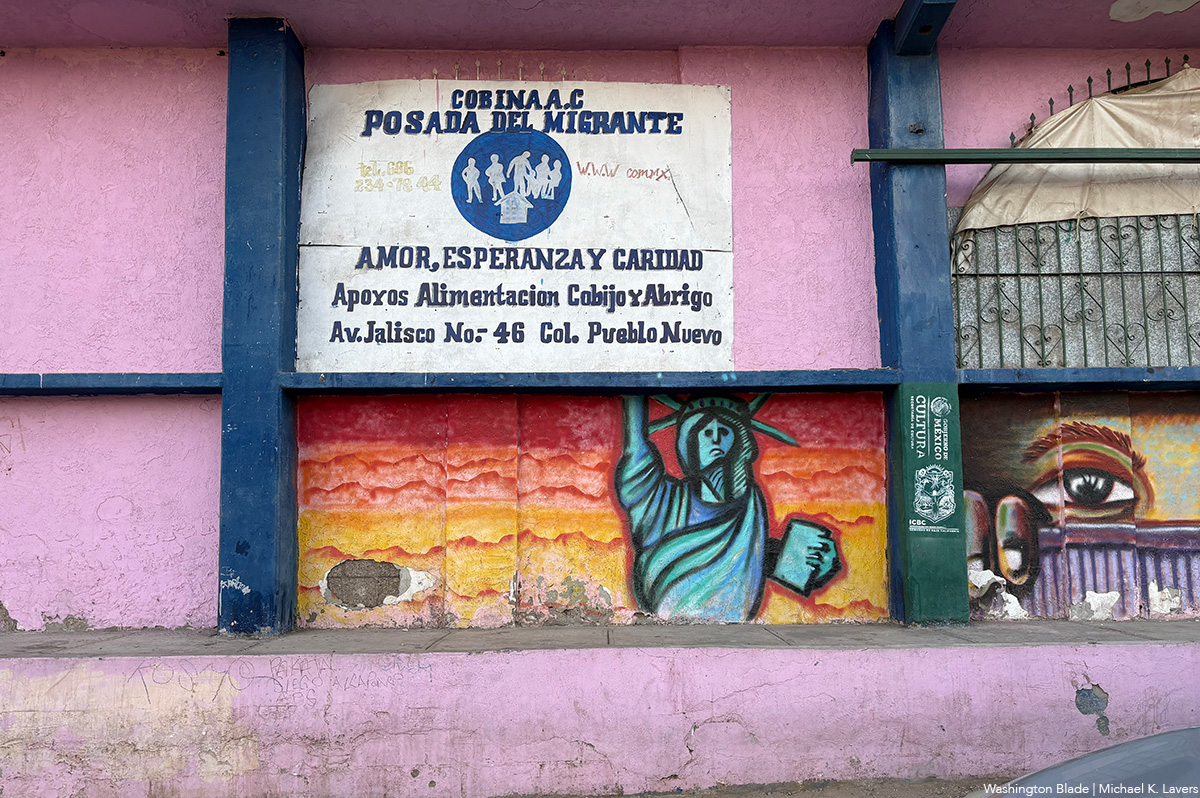
Advocacy groups say the State Department’s 2024 human rights report that “erased” LGBTQ+ people will jeopardize the cases of those who are seeking asylum in the U.S.
Immigration Equality notes the report “serve as key evidence for asylum seekers, attorneys, judges, and advocates who rely on them to assess human rights conditions and protection claims worldwide.”
The 2024 report the State Department released on Aug. 12 did not include LGBTQ+-specific references. Immigration Equality Director of Law and Policy Bridget Crawford in a statement said country-specific reports within the larger report “should be accurate, fact-based, and reflect the lived reality of LGBTQ people — not ignore and actively hide it.”
“When adjudicators see less information in these reports than in prior years, they may wrongly assume conditions have improved,” said Crawford. “In truth, the absence of reporting is a purely political move, not based in fact or reality.”
Organization for Refuge, Asylum and Migration Executive Director Steve Roth in a statement condemned the Trump-Vance administration’s “deliberate erasure of LGBTIQ communities from the 2024 human rights report — an unprecedented move that violates international standards.”
“This is a targeted and malicious act that will directly endanger lives,” he said.
Roth, like Immigration Equality, noted courts “around the world rely on these reports to evaluate asylum claims.”
“Stripping out documentation of LGBTIQ persecution removes a vital tool in assessing claims for protection, jeopardizing the ability of LGBTIQ asylum seekers to access safety,” said Roth.
Congress requires the State Department to release a human rights report each year.
The State Department usually releases them in the spring, as opposed to August. Then-State Department spokesperson Tammy Bruce, who president Donald Trump has nominated to become deputy representative at the U.N., during her last press briefing on Aug. 12 defended the delay and the report itself.
“We weren’t going to release something compiled and written by the previous administration,” said Bruce. “It needed to change based on the point of view and the vision of the Trump administration, and so those changes were made.”
Asylum courts ‘will have less credible data to rely on’
Jessica Stern, the former special U.S. envoy for the promotion of LGBTQ+ and intersex rights under the Biden-Harris administration, co-founded the Alliance for Diplomacy and Justice with several other former State Department officials.
The Alliance for Diplomacy and Justice in response to the report said the U.S. has “betrayed the trust of human rights defenders who risked their safety to share the truth” and added “some (of them) are now less safe.”
“Asylum courts in the U.S. and globally will have less credible data to rely on,” said the group.
Human Rights Watch echoed the Alliance for Diplomacy and Justice.
“The human rights report has been used in U.S. asylum court cases to show that an asylum seeker could not be returned to a country where similarly situated people were being persecuted,” said Human Rights Watch in response to the 2024 report. “That essential resource for keeping people safe is not only no longer reliable or helpful, but in some cases could put people at risk by denying abuses in places where the United States or other countries intend to deport asylum seekers and immigrants.”
State Department
LGBTQ people ‘erased’ from State Department’s 2024 human rights report
Document released Tuesday after months of delay

Advocacy groups on Tuesday sharply criticized the removal LGBTQ-specific references from the State Department’s 2024 human rights report.
The report, which the State Department released on Tuesday, does not reference Uganda’s Anti-Homosexuality Law and the impact it has had on the country’s LGBTQ community since President Yoweri Museveni signed it in 2023. The report, however, does note Ugandan government officials “reportedly committed acts of sexual violence.”
“NGOs reported police medical staff subjected at least 15 persons to forced anal examinations following their arrests,” it reads. “Opposition protesters stated security forces used or threatened to use forced anal examinations during interrogations.”
Uganda is among the dozens of countries in which consensual same-sex sexual relations remain criminalized. Authorities in the African country often use so-called anal tests to determine whether someone has engaged in homosexuality.
The report does not mention that Brazil has the highest number of reported murders of transgender people in the world. It does, however, note the President Luiz Inácio Lula da Silva in 2024 “undermined democratic debate by restricting access to online content deemed to ‘undermine democracy,’ disproportionately suppressing the speech of supporters of former President Jair Bolsonaro as well as journalists and elected politicians, often in secret proceedings that lacked due process guarantees.”
The report says there “were no credible reports of significant human rights abuses” in Hungary in 2024, even though Prime Minister Viktor Orbán’s government continued its anti-LGBTQ rights crackdown. The report does note Russian authorities last year “invoked a law prohibiting the distribution of ‘propaganda on nontraditional sexual relations’ to children.”
The State Department’s 2023 human rights report specifically notes a Russian law “prohibited gender transition procedures and gender-affirming care … and authorities used laws prohibiting the promotion of ‘non-traditional sexual relations’ to justify the arbitrary arrest of LGBTQI+ persons.” The 2023 report also cites reports that “state actors committed violence against LGBTQI+ individuals based on their sexual orientation or gender identity, particularly in Chechnya” and “government agents attacked, harassed, and threatened LGBTQI+ activists.”
“There were instances of non-state actor violence targeting LGBTQI+ persons and of police often failing to respond adequately to such incidents,” it adds.
The 2024 report does not mention Thai lawmakers last year approved a bill that extended marriage rights to same-sex couples. Gays and lesbians began to legally marry in the country in January.
Jessica Stern, the former special U.S. envoy for the promotion of LGBTQ and intersex rights under the Biden-Harris administration who co-founded the Alliance for Diplomacy and Justice, during a conference call with reporters on Tuesday said she and her colleagues “expected (the report) to be bad.”
“When we saw what the administration released, the truth is we were shocked and horrified,” said Stern.
Stern added the Trump-Vance administration “has erased or watered-down entire categories of abuse against people of African descent, indigenous people, Roma people, members of other marginalized racial and ethnic communities, workers, women and girls, and LGBTQI+ people.”
“It is deliberate erasure,” said Stern.
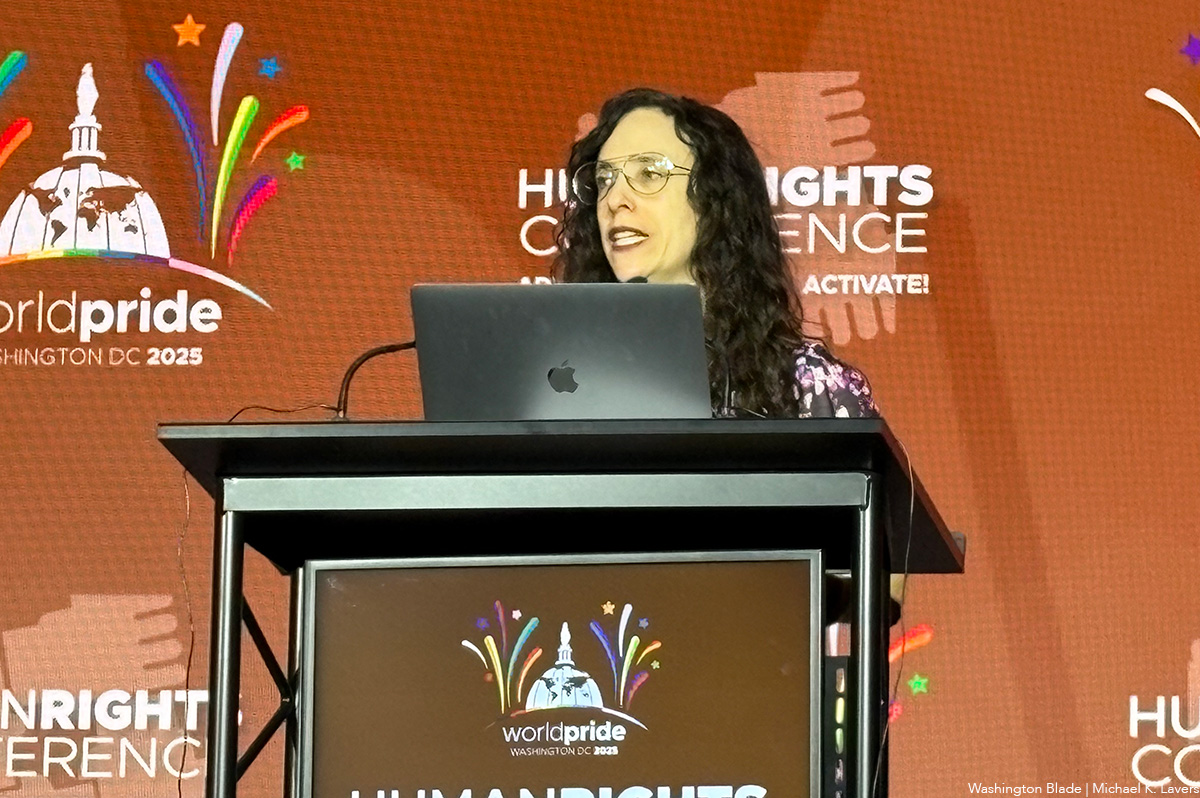
The Council for Global Equality in a statement condemned “the drastic restructuring and glaring omission of violence and abuse targeting lesbian, gay, bisexual, transgender, queer, and intersex (LGBTQI+) persons in the U.S.”
“We denounce the Trump administration’s efforts to politicize the State Department’s annual human rights reports by stripping longstanding references to human rights abuses targeting LGBTQI+ and other marginalized groups,” said Mark Bromley, the group’s co-chair.
Gay U.S. Rep. Mark Takano (D-Calif.), who chairs the Congressional Equality Caucus, echoed Bromley and Stern.
“Omitting the persecution of LGBTQI+ people from the human rights reports doesn’t erase the abuse, violence, and criminalization our community is facing around the world — it condones it,” said Takano in a statement.
“Erasing our community from these reports makes it that much harder for human rights advocates, the press, and the American people to be aware of the abuses LGBTQI+ people are facing worldwide,” he added.
Congress requires the State Department to release a human rights report each year. Foggy Bottom usually releases it in the spring.
Politico in March reported the Trump-Vance administration planned to cut “sections about the rights of women, the disabled, the LGBTQ+ community, and more” from the human rights report. State Department spokesperson Tammy Bruce, who President Donald Trump has nominated to become deputy representative at the U.N., on Tuesday during her last press briefing defended the report and the delay in releasing it.
“We weren’t going to release something compiled and written by the previous administration,” said Bruce. “It needed to change based on the point of view and the vision of the Trump administration, and so those changes were made.”
“It certainly promotes, as does our work, a respect for human rights around the globe,” added the former Fox News contributor who has described herself as a “gay woman.”
The Council for Global Equality and Democracy Forward has filed a Freedom of Information Act lawsuit. A press release notes it is “seeking the release of additional information … including any instructions provided by political appointees to strip references to abuses against LGBTQI+ persons from the reports.”
“The reports make LGBTQI+ persons and other minorities invisible and, in so doing, they undermine the human rights landscape that protects all of us,” said Bromley.
“Erasing our community from these reports makes it that much harder for human rights advocates, the press, and the American people to be aware of the abuses LGBTQI+ people are facing worldwide,” added Takano. “Failing to rectify this censorship will have real — and potentially deadly — consequences for LGBTQI+ people, including both for those who travel abroad from the U.S. and for LGBTQI+ people in countries whose leadership no longer need to worry about consequences for their human rights abuses. The State Department must reverse course and restore the LGBTQI+ section to these reports.”
A State Department spokesperson told the Washington Blade the “information included in the 2024 reports has been restructured and streamlined for better utility and accessibility, and to be more responsive to the legislative mandate for the (human rights report.)”
“The result directly addresses the reporting requirements as laid out in statute as well as being more streamlined, objective, universal, and accessible to the American public,” said the spokesperson.
The spokesperson did not comment on the FOIA lawsuit the Council for Global Equality and Democracy Forward has filed.
Politics
Transgender people removed from State Department travel page
Previous administration used LGBTQI+ acronym

The State Department has eliminated references to transgender travelers from its travel advisories.
The International Travel tab that the State Department’s Bureau of Consular Affairs maintains has a section for “LGB Travelers.”
“LGB travelers can face special challenges abroad,” reads the introduction. “Laws and attitudes in some countries may affect safety and ease of travel. Many countries do not recognize same-sex marriage. Many countries also only recognize the male and female sex markers in passports and do not have IT systems at ports of entry that can accept other sex markers. About 70 countries still consider consensual same-sex relations a crime. In some of these countries, individuals who engage in same-sex sexual relations may face severe punishment.”
Steven Romo of NBC News and other reporters have noted the same page before President Donald Trump took office used the LGBTQI+ acronym to describe the community. State Department officials with whom the Los Angeles Blade spoke during the Biden-Harris administration routinely used the LGBTQI+ acronym.
The State Department website is replacing LGBTQI+ with simply LGB
Last month vs today pic.twitter.com/U4U0DHMasR
— Steven Romo (@stevenromo) January 31, 2025
Trump since he took office on Jan. 20 has issued a number of executive orders that specifically target trans people.
One directive bans the State Department from issuing passports with “X” gender markers, reversing a policy that took effect in 2022.
Secretary of State Marco Rubio earlier this week issued a waiver that allows the President’s Emergency Plan for AIDS Relief and other “life-saving humanitarian assistance” programs to continue to operate during the freeze on nearly all U.S. foreign aid spending. The waiver does not apply to “activities that involve abortions, family planning conferences” and “gender or DEl ideology programs, transgender surgeries, or other non-life saving assistance.”
State Department
PEPFAR, other ‘life-saving humanitarian’ programs can operate under State Department waiver
Executive order froze nearly all US foreign aid spending for 90 days

Secretary of State Marco Rubio on Tuesday issued a waiver that allows the President’s Emergency Plan for AIDS Relief and other “life-saving humanitarian assistance” programs to continue to operate during the freeze on nearly all U.S. foreign aid spending.
Rubio on Jan. 24 directed State Department personnel to stop nearly all U.S. foreign aid spending for 90 days in response to an executive order that President Donald Trump signed after his inauguration. The Washington Blade obtained a copy of the waiver that Rubio on Tuesday issued to “all implementing U.S. government agencies, partners, and NGOs.”
“For the purposes of carrying out the president’s executive order on Reevaluating and Realigning United States Foreign Aid, I am approving an additional waiver of the pause under the executive order on Reevaluating and Realigning United States Foreign Aid and my subsequent direction of Jan. 24, 2025, for life-saving humanitarian assistance during the period of the review,” wrote Rubio. “Implementers of existing life-saving humanitarian assistance programs should continue or resume work if they have stopped, subject to the following directions. This resumption is temporary in nature, and except by separate waiver or as required to carry out this waiver, no new contracts shall be entered into.”
Rubio adds the “life-saving humanitarian assistance” waiver “applies to core life-saving medicine, medical services, food, shelter, and subsistence assistance, as well as supplies and reasonable administrative costs as necessary to deliver such assistance.” He notes the waiver does not apply to “activities that involve abortions, family planning conferences” and “gender or DEl ideology programs, transgender surgeries, or other non-life saving assistance.”
The waiver does not specifically cite PEPFAR, but UNAIDS Executive Director Winnie Byanyima in a statement welcomed it.
“UNAIDS welcomes this waiver from the U.S. government which ensures that millions of people living with HIV can continue to receive life-saving HIV medication during the assessment of US foreign development assistance,” she said. “This urgent decision recognizes PEPFAR’s critical role in the AIDS response and restores hope to people living with HIV.”
A memo the State Department released on Wednesday defended the decision to freeze most U.S. foreign aid spending. It also notes the waiver that Rubio issued.
“It is impossible to evaluate programs on autopilot because the participants — both inside and outside of government — have little to no incentive to share programmatic-level details so long as the dollars continue to flow,” reads the memo. “A temporary pause, with commonsense waivers for truly life-threatening situations, is the only way to scrutinize and prevent waste.”
The Blade has reached out to the State Department for comment on the waiver and its impact on PEPFAR.
State Department
New State Department policy bans embassies from flying Pride flag
Secretary of State Marco Rubio signed directive this week

The Los Angeles Blade has obtained a copy of a new State Department policy that bans embassies and other U.S. diplomatic institutions from flying the Pride flag.
“Per the Further Consolidated Appropriations Act 2024, only the United States of America flag is authorized to be flown or otherwise publicly displayed at U.S. facilities, both domestic and abroad, and featured in U.S. government content,” reads directive that Secretary of State Marco Rubio signed. “No symbol or affiliation marking other than those authorized by U.S. statute, the president, or the secretary may be displayed, projected, or exhibited at any U.S. facility, both domestic and abroad.”
The policy states the U.S. flag “unites all Americans under the universal principles of justice, liberty, and democracy.”
“These values, which are the bedrock of our great country, are shared by all American citizens, past and present,” it reads. “The U.S. flag is a powerful symbol of pride and it is fitting and respectful that only the U.S. flag be flown or displayed at U.S. facilities, both domestically and abroad and in accordance with Chapter 1 of 4 U.S. C. ‘The Flag.”
The policy’s only exception is the POW/MIA flag.
The previous administration banned Pride flags from flying at U.S. embassies. (The Blade in 2018 saw the Pride flag attached to the fence that surrounds the U.S. Embassy in Havana.)
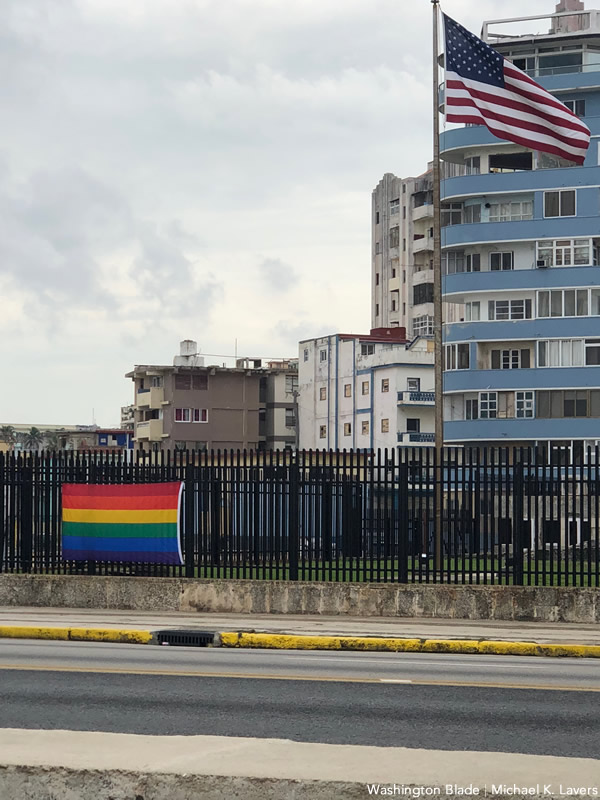
The State Department in 2021 for the first time flew the Progress Pride flag. Then-Deputy Secretary of State Wendy Sherman and then-Chief Diversity and Inclusion Officer Gina Abercrombie-Winstanley are among those who helped raise it. Then-Secretary of State Antony Blinken in 2021 said American diplomatic installations could once again fly the Pride flag.
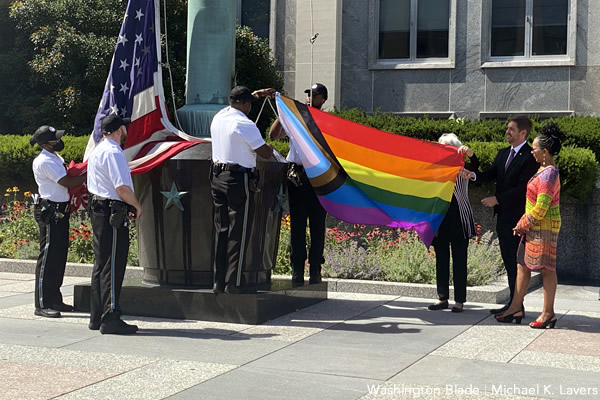
Former President Joe Biden last March signed a government spending bill with a provision that banned Pride flags from flying over U.S. embassies.
State Department
Trump executive order bans passports with ‘X’ gender markers
President signed directive hours after he took office

Editor’s note: This article has been updated.
A sweeping executive order that President Donald Trump issued on Monday bans the State Department from issuing passports with “X” gender markers.
Former Secretary of State Antony Blinken in June 2021 announced the State Department would begin to issue gender-neutral passports and documents for American citizens who were born overseas.
Dana Zzyym, an intersex U.S. Navy veteran who identifies as nonbinary, in 2015 filed a federal lawsuit against the State Department after it denied their application for a passport with an “X” gender marker. Zzyym in October 2021 received the first gender-neutral American passport.
The State Department policy took effect on April 11, 2022.
“The secretaries of State and Homeland Security, and the director of the Office of Personnel Management, shall implement changes to require that government-issued identification documents, including passports, visas, and Global Entry cards, accurately reflect the holder’s sex,” reads Trump’s executive order.
The gender marker is among the provisions contained within Trump’s executive order titled “Defending women from gender ideology extremism and restoring biological truth to the federal government.” Trump in his inaugural speech said the federal government’s “official policy” is “there are only two genders, male and female.”
White House Press Secretary Karoline Leavitt on Tuesday told the NOTUS website the executive order is not retroactive and will not invalidate current passports with a gender-neutral gender marker.
“They can still apply to renew their passport — they just have to use their God-given sex, which was decided at birth,” said Leavitt. “Thanks to President Trump, it is now the official policy of the federal government that there are only two sexes — male and female.”
The Los Angeles Blade on Thursday obtained a memo that directs State Department personnel to “suspend any application requesting an ‘X’ sex marker and do not take any further action pending additional guidance from the department.”
“Please also suspend any application where the applicant is seeking to change their sex marker from that defined in the executive order
pending further guidance,” it reads. “This guidance applies to all applications currently in progress and any future applications. Guidance on existing passports containing an ‘X’ sex marker will come via other channels.”
Secretary of State Marco Rubio signed the memo.
State Department
Senate confirms Marco Rubio as next secretary of state
Fla. Republican will succeed Antony Blinken

The U.S. Senate on Monday confirmed U.S. Sen. Marco Rubio (R-Fla.) to become the next secretary of state.
The vote took place hours after President Donald Trump’s inauguration. The Senate Foreign Relations Committee on Monday advanced Rubio’s nomination before senators approved it by a 99-0 vote margin.
The promotion of LGBTQ+ and intersex rights abroad was a cornerstone of the Biden-Harris administration’s foreign policy.
Rubio in 2022 defended Florida’s “Don’t Say Gay” law that Republican Gov. Ron DeSantis signed. The Florida Republican that year also voted against the Respect for Marriage Act that passed with bipartisan support.
Rubio during his Jan. 15 confirmation hearing did not speak about LGBTQ+ rights.
State Department
Tammy Bruce to become next State Department spokesperson
Lesbian Fox News contributor has made anti-trans comments

President-elect Donald Trump has announced Tammy Bruce will become the next State Department spokesperson.
Bruce is a Fox News contributor who has described herself as a “gay woman” on the network. A GLAAD spokesperson on Monday pointed out to the Washington Blade that Bruce has also made anti-transgender comments.
“Tammy is a highly respected political analyst who understood the power of importance of ‘MAGA’ early on,” said Trump in a Jan. 3 Truth Social post that announced her appointment. “She received her bachelor’s degree in political science at the University of Southern California and, after being a liberal activist in the 1990s, saw the lies and fraud of the Radical Left, and quickly became one of the strongest Conservative voices on radio and television.”
Outstanding choice @HeyTammyBruce is a true professional & patriot pic.twitter.com/RuVKL6NwwO
— Jim Hanson (@JimHansonDC) January 4, 2025
Trump has nominated U.S. Sen. Marco Rubio (R-Fla.) to succeed Secretary of State Antony Blinken.
Ned Price in 2021 became the State Department’s first openly gay spokesperson. He stepped down in March 2023.
State Department
State Department honors Ghanaian LGBTQ+ activist
Ebenezer Peegan among Secretary of State’s Human Rights Defender Award recipients

The State Department on Tuesday honored a Ghanaian LGBTQ+ activist and seven other human rights advocates from around the world.
Secretary of State Antony Blinken presented Rightify Ghana Executive Director Ebenezer Peegah with the Secretary of State’s Human Rights Defender Award during a ceremony at the State Department.
“He’s been a prominent figure advocating for equality and justice,” Deputy Assistant Secretary of State in the Bureau of Democracy, Human Rights, and Labor Enrique Roig told the Washington Blade on Tuesday during an interview.
The other human rights activists who received the award include:
• Mary Ann Abunda, a migrant workers advocate in Kuwait
• Permanent Human Rights Assembly of Bolivia President Amparo Carvajal
• Aida Dzhumanazarova, country director for the International Center for Not-for-Profit Law in Kyrgyzstan
• Mang Hre Lian, founder of the Chin Media Network in Myanmar
• Juana Ruiz of Asociación Asvidas, an organization that advocates for survivors of gender-based violence in Colombia
• Rufat Sararov, a former prosecutor who runs Defense Line in Azerbaijan
The State Department posthumously honored Thulani Maseko, a prominent human rights activist from Eswatini who was killed in 2023. His wife, Tanele Maseko, accepted the award on his behalf.
The ceremony took place on International Human Rights Day, which commemorates the U.N. General Assembly’s ratification of the Universal Declaration of Human Rights on Dec. 10, 1948. Sararov did not attend because Azeri authorities arrested him before he could obtain a visa that would have allowed him to travel to the U.S.
Ghanaian Supreme Court to rule on anti-LGBTQ+ law on Dec. 18
Ghanaian lawmakers on Feb. 28 approved the Promotion of Proper Human Sexual Rights and Ghanaian Family Values Bill that would, among other things, criminalize allyship. President Nana Akufo-Addo has said he will not sign the bill until the Supreme Court rules on whether it is constitutional or not.
The Supreme Court is expected to rule on the law on Dec. 18. John Dramani Mahama, the country’s president-elect, will take office on Jan. 7.
Ruig applauded Peegah’s efforts to highlight the Promotion of Proper Human Sexual Rights and Ghanaian Family Values Bill.
“For us in the U.S. government, the work that he’s done on this issue has also been instrumental in our own discussions with the current government as well as the incoming administration around the concerns that we’ve expressed with regards to this legislation,” Roig told the Washington Blade “He’s been an important partner in all this as well.”
Peegah on Aug. 14 met with Pope Francis at the Vatican.
State Department
State Department hosts meeting on LGBTQ rights and foreign policy
Event took place before Pride Month reception

Secretary of State Antony Blinken on Thursday hosted a group of LGBTQ activists and politicians from around the world at the State Department.
The event — described as a “Convening on U.S. Foreign Policy: National Security, Inclusive Development, and the Human Rights of LGBTQI+ Persons” — took place before the State Department’s annual Pride Month reception. Participants included:
• Jessica Stern, the special U.S. envoy for the promotion of LGBTQ and intersex rights
• U.S. Ambassador to the U.N. Linda Thomas-Greenfield
• U.S. Trade Representative Katherine Tai
• U.S. Ambassador to India Eric Garcetti
• Suzanne Goldberg, senior advisor to the Under Secretary of State for Civil Security, Democracy, and Human Rights
• Under Secretary of State for Civilian Security, Democracy, and Human Rights Uzra Zeya
• U.S. Agency for International Development Senior LGBTQI+ Coordinator Jay Gilliam
• USAID Counselor Clinton D. White
• National Security Council Senior Director for Democracy and Human Rights Kelly Razzouk
• Assistant U.S. Secretary of Health Adm. Rachel Levine
• National Security Council Human Rights Director Jess Huber
• U.N. Assistant Secretary General for Human Rights Ilze Brandt Kehris
• Icelandic Ambassador to the U.S. Bergdís Ellertsdóttir
• Council for Global Equality Co-Executive Director Mark Bromley
• Outright International Senior Advisor for Global Intersex Rights Kimberly Zieselman
• Essy Adhiambo, executive director of the Institute for Equality and Non Discrimination in Kenya
• Pau González, co-chair of Hombres Trans Panamá and PFLAG-Panamá
“Forty-five years ago, thousands gathered in D.C. in what became the first national march for LGBTQI+, demanding their voices be heard,” said Thomas-Greenfield in a post to her X account that showed her speaking at the event. “We must continue to carry forward the spirit of these pioneers and fight for equal rights and dignity for all.”
Forty-five years ago, thousands gathered in DC in what became the first national march for LGBTQI+, demanding their voices be heard.
We must continue to carry forward the spirit of these pioneers and fight for equal rights and dignity for all. 🏳️🌈🏳️⚧️ pic.twitter.com/oph2Ahmfhq
— Ambassador Linda Thomas-Greenfield (@USAmbUN) June 28, 2024
President Joe Biden in 2021 signed a memo that committed the U.S. to promoting LGBTQ and intersex rights abroad as part of his administration’s overall foreign policy.
“LGBTQI+ rights are human rights,” said Blinken. “Our government has a responsibility to defend them, to promote them — here and everywhere.”
Blinken noted consensual same-sex sexual relations remain criminalized in 64 countries, with the death penalty in 11 of them.
He specifically highlighted Uganda’s Anti-Homosexuality Act and Hungarian Prime Minister Viktor Orbán’s government’s “smearing scapegoating, stigmatizing LGBTQI+ persons — vilifying them with degrading labels, denying them equal rights, normalizing violence against them.” (Gay U.S. Ambassador to Hungary David Pressman this month marched in the annual Budapest Pride parade.)
Blinken noted Iraqi MPs earlier this year “passed legislation that punishes same-sex relations with up to 15 years in prison.” He also pointed out that Indonesian lawmakers approved a new criminal code banning extramarital sex.
“In a nation where same-sex couples cannot marry, these laws effectively make all same-sex conduct illegal and they undermine privacy for all Indonesians,” said Blinken.
“We’re defending and promoting LGBTQI+ rights around the world,” he said.
Blinken noted seven countries — Barbados, St. Kitts and Nevis, Antigua and Barbuda, Dominica, Namibia, Singapore, the Cook Islands — have decriminalized consensual same-sex sexual relations over the last two years. He also highlighted Greece, Liechtenstein, and Thailand this year extended marriage rights to same-sex couples, and other countries are banning so-called “conversion therapy.”
“These achievements are possible because of incredibly courageous human rights defenders and government partners on the ground, but I believe America’s support is indispensable,” said Blinken. “When we engage — sometimes publicly, sometimes privately, sometimes both — when we share our own knowledge and experience, we can and we do achieve change.”
Blinken also announced the U.S. now considers sexual orientation and gender identity are part of the International Covenant on Civil and Political Rights that took effect in 1976.
“This is one of the key treaties committing nations to upholding universal rights,” he said.
“In our regular reporting to the council on human rights, we will continue to include incidents of discrimination or abuse committed against LGBTQI+ persons, now with the clear framework of this well-supported interpretation,” added Blinken. “That will further empower our efforts.”
Blinken reiterated this point and the Biden-Harris administration’s commitment to the promotion of LGBTQ and intersex rights abroad when he spoke at the State Department’s Pride Month event.
“Defending, promoting LGBTQI+ rights globally is the right thing to do, but beyond that, it’s the smart and necessary thing to do for our country, for our national security, for our well-being,” he said.
-

 Commentary3 days ago
Commentary3 days agoThe perfect storm: Our queer infrastructure is in crisis
-

 a&e features5 days ago
a&e features5 days ago“I should have been there”: A queer Korean adoptee finds healing with original family members
-
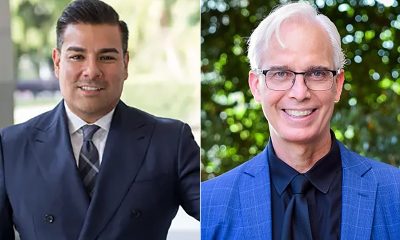
 California5 days ago
California5 days agoRicardo Lara, John Heilman inducted into Victory Institute’s Hall of Fame
-

 Television3 days ago
Television3 days ago‘Heated Rivalry’ is the gay hockey romance you didn’t know you needed
-
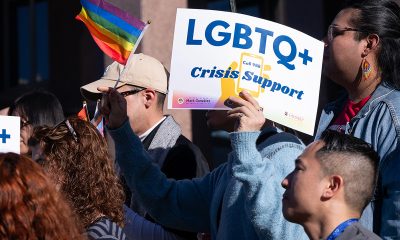
 LGBTQ+ Youth Mental Health4 days ago
LGBTQ+ Youth Mental Health4 days agoL.A. County officials advocate to reinstate “Press 3” crisis hotline for young queer people
-

 Los Angeles2 days ago
Los Angeles2 days agoRecent L.A. County report reveals record number of hate crimes against transgender and nonbinary community members
-

 Commentary2 days ago
Commentary2 days agoLove in the time of porn: a glimpse into the dating life of an adult performer
-

 Music & Concerts2 days ago
Music & Concerts2 days agoSalina EsTitties and GMCLA are primed and ready for this weekend’s ‘Holiday Legends’
-

 Books10 hours ago
Books10 hours agoThe best books to give this holiday season
-

 Health17 hours ago
Health17 hours agoChoose U ambassadors share lived experiences with HIV, personal reflections, and insights



